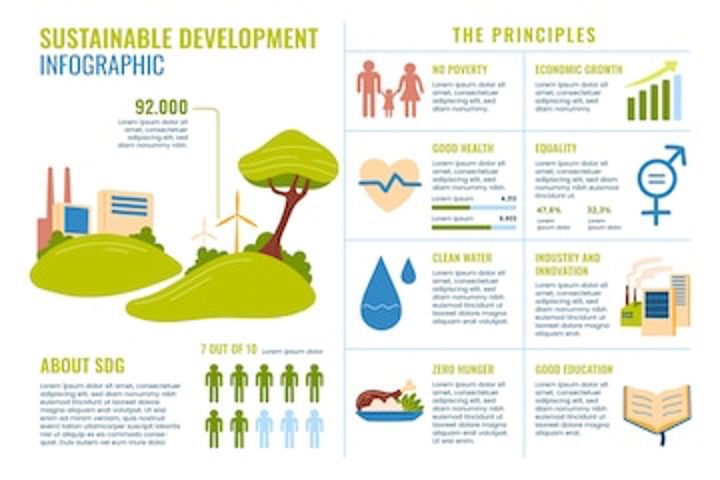The Principles of Sustainability in Construction and How They Benefit Your Business
Becoming a sustainable business involves identifying and reducing your business’s negative impacts on the environment. Sustainability is not just about being ‘green’. It’s about creating a healthy balance between your organization, people, and the natural world around you. By integrating sustainability into your business practices, you can lower costs, increase efficiency, and attract new customers. This article explains what sustainability in construction means and why it matters to businesses. You will also learn about the principles of sustainability in construction and how they benefit your business. Keep reading to discover more!

What does it mean to be sustainable?
Sustainability is the ability to continue delivering results without depleting resources. A sustainable business is one that can still be profitable and successful even if the environment were to become significantly less hospitable to its operations. Sustainable businesses are resilient to risk. The term “sustainability” has been used to describe a broad range of practices. There is no one definition of sustainability. It has been used as a synonym for “greenhouse gas emissions reduction,” “energy conservation,” and “environmental protection,” but these are just a few examples. A more precise definition of sustainability is the capacity to meet the needs of the present without compromising the ability of future generations to meet their own needs.
Why is sustainability in construction important?
Construction accounts for 8% of the UK’s GDP, and 20% of its employment. It is also responsible for nearly 40% of the country’s CO2 emissions. If construction companies don’t take steps to reduce their environmental impact, they will struggle to win public support and meet demand for new construction projects. Cost-effectiveness, economic growth, and resource conservation are just a few reasons to make sustainability a priority for construction companies. Sustainability will also help you attract new customers, increase staff retention, and lower your organization’s risk of failure.
Sustainable principles in construction
There are six principles of sustainable construction: Resource Efficiency, Health & Wellbeing, Equity & Inclusion, Good Governance, Circular Economy, and Climate Change. These principles are integrated together to help you achieve sustainable results. This list is not comprehensive, but it should give you a better understanding of the different aspects of sustainability and how they work together. Resource Efficiency – This principle focuses on reducing the demand for resources. It helps you reduce waste, use water efficiently, and minimize your use of energy. This principle is important because we are currently finding it difficult to meet the world’s growing demand for resources. Health & Wellbeing – This principle looks at health and safety issues during the building process. It also considers the long-term impact of your building on its occupants. This principle focuses on improving indoor air quality and reducing hazards to occupants. Equity & Inclusion – This principle focuses on making sure that people from all backgrounds and walks of life are able to access the benefits of the built environment. Good Governance – This principle is about the way you manage your business and the way you interact with suppliers and customers. Circular Economy – This principle is about using materials and products in a way that allows them to be reused or repurposed. It is about designing products for disassembly and about using materials that can be re-used. Climate Change – This principle allows you to consider the broader social and economic impact of your actions and allows you to encourage others to do the same. When you focus on climate change, you look at how the built environment impacts greenhouse gas emissions.
Benefits of Sustainable Construction for Businesses
There are many benefits to sustainable construction practices. The main benefits are cost savings, reduced risk, and increased brand recognition. Cost savings – Sustainable practices often result in lower costs over the long term. You can reduce your operating costs by installing energy-efficient equipment, investing in more efficient building materials, and choosing appropriate cleaning products. Reduced risk – A sustainable business is less likely to suffer from operational failure. This is due to the fact that sustainable companies are more prepared for natural disasters and they produce less waste. Increased brand recognition – Customers increasingly want to support and buy from businesses that are committed to sustainable practices. Customers are also willing to pay a premium for green products, so these can be an opportunity for increased revenue.
Key takeaway
Sustainability is not just about being ‘green’. It’s about creating a healthy balance between your organization, people, and the natural world around you. By integrating sustainability into your business practices, you can lower costs, increase efficiency, and attract new customers. By integrating sustainability into your business practices, you can lower costs, increase efficiency, and attract new customers. To do this, you need to adopt the following six principles: resource efficiency, health & wellness, equity & inclusion, good governance, a circular economy, and climate change.

